Wonder Woman 1984 is full of plot points and themes that are commonly found in comic book movies, whether it's the eponymous superhero losing some of their powers or choosing to give up a romantic relationship for the greater good. It also falls victim to one of the stranger cliches in superhero cinema: a "nerdy" individual turning into a sophisticated supervillain. More than that, this archetype is particularly rampant among comic book films since they tend to style these characters in eerily similar ways.
To illustrate this, Twitter user cody_horrible posted a tweet bringing together photos of the many superhero movie villains that embody the trope. Those pictured include Cheetah from Wonder Woman 1984, Electro from The Amazing Spider-Man 2, Catwoman from Batman Returns, Poison Ivy from Batman & Robin, Aldrich Killian from Iron Man 3 and The Ridder from Batman Forever. Side by side like this, it becomes more obvious just how oddly identical these characters are in their pre-villain state, from their glasses and messy hairdos to the over-the-top, cheesy way many of them smile.
The thinking behind this trope seems simple enough: having these villains begin as adorkable everyday people whom others either ignore or mistreat is an easy way to make them sympathetic from the get-go. In Wonder Woman 1984, Cheetah starts out as Barbara Minerva, a clumsy geologist and gemologist who might as well be invisible to many of her co-workers, yet is unwaveringly kind and quickly strikes up a friendship with Diana Prince. For those reasons, it's understandable why she would wish on the Dreamstone to be more like Diana and why it's so tragic when it grants her Diana's strength, but at the cost of Barbara's humanity.
Like Barbara, the other comic book movie villains who fit this trope start off looking like stereotypical nerds before evolving into far more stylish evil-doers. Clearly, the idea is to create a strong juxtaposition between their pre-transformation identities and the antagonists they become, while at the same time illustrating how committed these newly created villains are to distinguishing themselves from who they used to be. However, this does give rise to a frustrating trend that associates wearing glasses and, to a lesser degree, not dressing stylishly with being weak and unattractive.
Similarly, this trope arguably reinforces a problematic idea: those who gain power after being marginalized will use it for self-serving purposes or to harm others. To be fair, Wonder Woman 1984 shifts the archetype somewhat -- for example, Barbara uses her strength to fight a drunken man who tried to assault her early on in the film. At the same time, the movie has been criticized for framing Barbara's actions as unquestionably bad, rather than acknowledging the moral complexity of a woman beating up her would-be assailant.
In the end, Barbara/Cheetah from Wonder Woman 1984 is far better developed and more sympathetic than other versions of the "nerd becomes a villain" comic book movie trope (especially Amazing Spider-Man 2's Electro) -- but it still embodies the archetype's inherent flaws. Not helping matters, these characters tend to be so alike in their pre-supervillain state that it's become harder and harder to make them compelling and not come across as self-parodies over time. That's to say, it would be best if the antagonist in the now-confirmed Wonder Woman 3 avoided this overdone trope entirely.
Directed and co-written by Patty Jenkins, Wonder Woman 1984 stars Gal Gadot, Chris Pine, Kristen Wiig, Pedro Pascal and Natasha Rothwell. The film is now available in theaters and on HBO Max.


